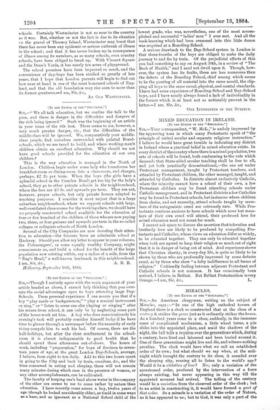MIXED EDUCATION IN IRELAND.
[TO THE EDITOR OF THE "SPECTATOR?']
SIR,—Your correspondent, "W. McL.," is unduly impressed by the approving tone in which many Protestants speak of "the principle of united secular and separate religious instruction." I believe he would have great trouble in indicating any district in Ireland where a practical belief in mixed education exists. In every district of the country where there is a mixed population, two sets of schools will be found, both conforming to the rule which demands that State-aided secular teaching shall be free to all, and yet both practically denominational,—the one set under Protestant management, taught by Protestant teachers, and attended by Protestant children, the other managed, taught, and attended by Catholics. In districts almost exclusively Catholic, where the minority cannot have a school of their own, a few Protestant children may be found attending schools under Catholic management, and in Protestant districts a few Catholics may be found in Protestant schools, but instances where children, from choice, and not necessity, attend schools taught by mem- bers of the antagonistic creed are extremely rare. While Pro- testants continue anxious to have schools which none but mem- bers of their own creed will attend, their professed love for mixed education need not count for much.
I cannot ask space to discuss the assertion that toleration and. brotherly love are likely to be produced by compelling Pro- testants and Catholics, whose views on education differ so widely, to be educated together. They can only be educated together when both are agreed to keep their religion so much out of sight that it is in danger of being out of mind. And experience shows that Christian charity, in every-day life, is quite as likely to be shown by those who are profoundly impressed by some definite creed, as by those who show "a lofty indifference to all forms of religion." Unfriendly feeling between adjacent Protestant and. Catholic schools is not common. It has occasionally been noticed, I believe, in Belfast. But Belfast Protestantism is very


































 Previous page
Previous page